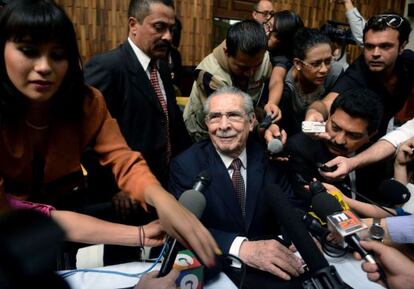Former Guatemalan dictator goes on trial for genocide
Two witnesses describe how soldiers massacred an Indian village in 1982

Two survivors of a massacre that took place during Guatemala’s bloody Civil War described in court on Tuesday how government soldiers invaded an Indian village in 1982 and killed some 30 people, including family members of the two witnesses.
The two men, who were children at the time of the incidents, were the first witnesses called by human rights prosecutors on the opening day in the long-awaited trial of former dictator Efraín Ríos Montt and two other former top military officials, who are charged with genocide. It is the first time that a former Guatemalan leader has been put in the dock for abuses committed during the country’s 36-year-old civil war, which ended with the 1996 peace accords.
Last year, a court ordered the 86-year-old Ríos Montt — who ruled from March 23, 1982 to August 8, 1983 — to be placed under house arrest until his trial. Another court upheld the ruling last month. A codefendant, José Mauricio Rodríguez Sánchez, the former intelligence chief during Ríos Montt’s rule, is being held at a hospital because of ill health.
Some 1,500 people, most of whom lost family members during the Civil War, gathered outside the courtroom holding photographs of their loved ones. Some demanded that Ríos Montt be forced to take the stand “so we can learn the truth.”
The three defendants are specifically charged with crimes connected to the rapes and murders of some 1,770 members of the Ixil Indian tribe during a series of massacres in 1982. Nicolás Brito, a survivor of a massacre that took place in Nebaj, Quiché on March 25, 1982, described how the military officers invaded his village and began shooting people at random. Bernardo Bernal, who was nine years old at the time, said that he counted at least 30 people killed in that same massacre.
Lawyers for the former dictator continued to present arguments as to why the trial against their client should be suspended. Francisco García Gudiel, who announced that he had just joined Ríos Montt’s legal team, asked that the proceedings be postponed for “at least five days” so that he could read the “complaint in detail.” Rejecting his petition, the judge said that if he accepted joining the retired general’s defense team, he must have been prepared to take on the case.
Human rights prosecutors say they have 142 statements from witnesses that directly link the defendants to the crimes and other abuses.
Ríos Montt, who was never prosecuted because he enjoyed parliamentary immunity until early last year, declined to make any comments to reporters. However, he did greet some supporters, who were waiting for him at the courthouse.
Zuly Ríos, the former dictator’s daughter, told reporters that her father “prays for Guatemala and for his health every day.”
Nobel Prize-winner Rigoberta Menchú, who has filed complaints against Guatemala’s military leaders with the Spanish High Court, said it was “an historic day for all the Mayan people. If crimes were committed against the Ixil Indian communities in the north, Menchú said other abuses “no doubt occurred against other Indian communities.”
Alberto Brunori, UN High Commissioner for Human Rights in Guatemala, has asked that Guatemalans “respect the final verdict, no matter what it is.”
Tu suscripción se está usando en otro dispositivo
¿Quieres añadir otro usuario a tu suscripción?
Si continúas leyendo en este dispositivo, no se podrá leer en el otro.
FlechaTu suscripción se está usando en otro dispositivo y solo puedes acceder a EL PAÍS desde un dispositivo a la vez.
Si quieres compartir tu cuenta, cambia tu suscripción a la modalidad Premium, así podrás añadir otro usuario. Cada uno accederá con su propia cuenta de email, lo que os permitirá personalizar vuestra experiencia en EL PAÍS.
¿Tienes una suscripción de empresa? Accede aquí para contratar más cuentas.
En el caso de no saber quién está usando tu cuenta, te recomendamos cambiar tu contraseña aquí.
Si decides continuar compartiendo tu cuenta, este mensaje se mostrará en tu dispositivo y en el de la otra persona que está usando tu cuenta de forma indefinida, afectando a tu experiencia de lectura. Puedes consultar aquí los términos y condiciones de la suscripción digital.








































